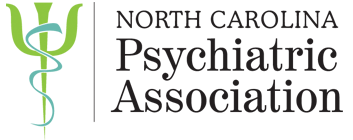North Carolina Psychiatric Association
The North Carolina Neuropsychiatric Association (NCNPA) was established on January 18, 1935, during a meeting at Dorthea Dix Hospital. At that time, there were 28 psychiatrists across North Carolina, with the great majority practicing in private or public hospitals. In 1946, the Association became an affiliate of the American Psychiatric Association (APA).
The NCNPA’s first petition to become a District Branch within the APA was rejected in 1955 based on differences between the two organizations’ membership criteria. However, later that year, the Association created a parallel organization, the North Carolina District Branch, which was accepted into the APA Assembly of District Branches on April 30, 1956.
The two state organizations merged in October 1970, and the Association’s name was changed to North Carolina Psychiatric Association in 1985.
Mission
The North Carolina Psychiatric Association is a professional medical organization representing nearly 1,000 psychiatrists statewide. Our mission is to:
- Promote the highest quality care for North Carolina residents with mental illness, including substance use disorders
- Advance and represent the profession of psychiatry and medicine in North Carolina
- Serve the professional needs of its membership
2020-2023 Strategic Plan
Goal 1: Advocate for our profession to relevant parties that our work as physicians is essential by promoting psychiatric leadership in key stakeholder groups, engaging in legislative advocacy, and highlighting psychiatry as an integral part of integrated care models.
- Use NCPA to put psychiatrists front-and-center of state and local challenges to help solve state problems. For example, encourage psychiatrists to advocate for mental health in schools, become the leaders in advocating for our patients in the community, and develop relationships with local leaders.
- NCPA to identify evidence-based practices and serve as a platform for the distribution and implementation of these practices by psychiatrists across North Carolina (e.g. integrated care, and addiction treatment).
- Poll the membership about what legislative issues interest them e.g., mental health parity, red flag gun laws, making conversion therapy illegal, getting private insurance to cover collaborative care).
- Develop an ongoing list/resource guide/meetings of organizations important for psychiatry to engage with.
Goal 2: Use NPCA resources to help members adopt and optimize new technologies.
- Reach out to members regarding implementation needs for adopting EHRs in their practices.
- Review, reorganize, and consolidate the resources on the NCPA website and develop a strategy to promote these tools to our members.
- Review current telepsychiatry state policy and information on the NCPA and APA websites. Organize these into a resource for members.
- Consider how to use technology to provide learning communities for NCPA members on these and other topics.
Goal 3: Continuously learn about our members’ changing needs to remain relevant, foster member engagement, combat isolation and burnout, and rekindle pride in the profession.
- Create a Task Force to study and develop a plan for regional meetings across the state.
- Survey members regarding wellness, isolation, and burnout.
- Bring in nationally known speakers to the annual meeting to address physician wellness.
- Use NCPA communication vehicles—print and electronic newsletters, social media—to share meaningful resources with members, such as inspirational stories, books, films, podcasts, etc.
- Based on the work of the Regional Meeting Task Force, schedule meetings to provide a local supportive clinical network, meet-up opportunities, and to identify local clinical concerns.
- Continuously communicate, share, and promote the work and accomplishments of NCPA to members.
|
